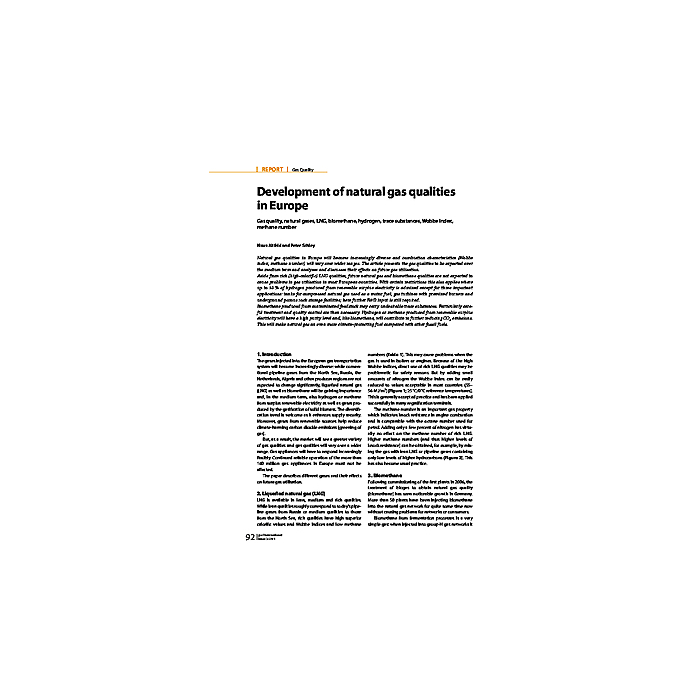Development of natural gas qualities in Europe
4,90 €
Auf Lager
Artikelnummer
00258_2011_02_01
Natural gas qualities in Europe will become increasingly diverse and combustion characteristics (Wobbe index, methane number) will vary over wider ranges. The article presents the gas qualities to be expected over the medium term and analyses and discusses their effects on future gas utilisation. Aside from rich (high-calorific) LNG qualities, future natural gas and biomethane qualities are not expected to cause problems in gas utilisation in most European countries. With certain restrictions this also applies where up to 10?% of hydrogen produced from renewable surplus electricity is admixed except for three important applications: tanks for compressed natural gas used as a motor fuel, gas turbines with premixed burners and underground porous rock storage facilities; here further R&D input is still required. Biomethane produced from contaminated feedstock may carry undesirable trace substances. Particularly careful treatment and quality control are then necessary. Hydrogen or methane produced from renewable surplus electricity will have a high purity level and, like biomethane, will contribute to further reducing CO2 emissions. This will make natural gas an even more climate-protecting fuel compared with other fossil fuels.
| Autoren | Klaus Altfeld and Peter Schley |
|---|---|
| Erscheinungsdatum | 01.02.2011 |
| Format | |
| Zeitschrift | gas for energy - Issue 02 2011 |
| Verlag | DIV Deutscher Industrieverlag GmbH |
| Sprache | English |
| Seitenzahl | 7 |
| Titel | Development of natural gas qualities in Europe |
| Beschreibung | Natural gas qualities in Europe will become increasingly diverse and combustion characteristics (Wobbe index, methane number) will vary over wider ranges. The article presents the gas qualities to be expected over the medium term and analyses and discusses their effects on future gas utilisation. Aside from rich (high-calorific) LNG qualities, future natural gas and biomethane qualities are not expected to cause problems in gas utilisation in most European countries. With certain restrictions this also applies where up to 10?% of hydrogen produced from renewable surplus electricity is admixed except for three important applications: tanks for compressed natural gas used as a motor fuel, gas turbines with premixed burners and underground porous rock storage facilities; here further R&D input is still required. Biomethane produced from contaminated feedstock may carry undesirable trace substances. Particularly careful treatment and quality control are then necessary. Hydrogen or methane produced from renewable surplus electricity will have a high purity level and, like biomethane, will contribute to further reducing CO2 emissions. This will make natural gas an even more climate-protecting fuel compared with other fossil fuels. |
Eigene Bewertung schreiben


